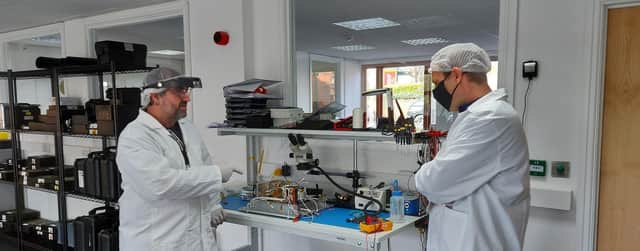Satellite with Portsmouth-built payload set for launch at Nasa's Kennedy Space Center on Space X rocket after slight delay


The Faraday Phoneix satellite, funded by £4.9m from the UK Space Agency, was worked on by Airbus in the city and led by In-Space Missions in Alton.
It was initially due to be launched during a four-hour window at Nasa’s Kennedy Space Center in Florida on Friday.
Advertisement
Hide AdAdvertisement
Hide AdBut the mission was postponed until Monday evening instead, with a new four-hour window from 8pm.
And the team behind the space-tech are excited to have played a part in the launch.
Doug Liddle, chief executive at In-Space Missions, said: ‘The team here at In-Space is incredibly proud to be launching our highly capable and innovative satellite which has come together in less than a year.
‘We’re particularly excited to be flying on a Falcon 9 from Cape Canaveral - a location with such an amazing history.’
Advertisement
Hide AdAdvertisement
Hide AdAmong the six payloads on the satellite will be one from Airbus.
This is an Airbus Prometheus 1, built in Portsmouth, and will be able to survey radio spectrum usage across the world from orbit, detect radar tracking of the Faraday Phoenix satellite, and potentially identify and locate search and rescue beacons.
Another payload will be from Lacuna Space, which is developing a service for the so-called internet of things – connected devices – so it can work in rural areas.
The company – which won £800,000 from funding from the UK Space Agency – uses sensors that can monitor the environment, track wildlife and d help farmers by providing data on the health of cattle and crops and for water and soil management.
Advertisement
Hide AdAdvertisement
Hide AdIts sensors can fit in the palm of your hand and run for a year on a single battery charge.
Chief executive Rob Spurrett said: ‘Much like the early days of the internet, when it was hard to imagine the impact of having everybody connected, it seems there is an endless world of possibilities from now connecting physical objects or things.
‘In cities there are many possible ways to do that, but our service ensures that rural parts of the UK and even the most remote locations in the world are part of this data revolution.’
The mission will also fly In-Space’s own Babel payload as the first incarnation of a future digital, uploadable payload offering within the Faraday service. This first version is a high gain, wideband software defined radio with enabling a number of different applications to be uploaded and exercised – from tracking ship radars to creating heat maps of 4G mobile usage.
A message from the Editor, Mark Waldron
You can subscribe here for unlimited access to our online coverage, including Pompey, with 70 per cent fewer adverts for less than 20p a day.
Comment Guidelines
National World encourages reader discussion on our stories. User feedback, insights and back-and-forth exchanges add a rich layer of context to reporting. Please review our Community Guidelines before commenting.
